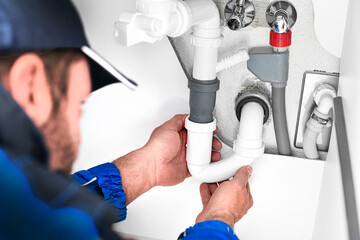Whether you’re dealing with a burst pipe, flooded basement, or backed-up sewer, it’s important to call an Emergency Plumber immediately. The longer these problems go unresolved, the more damage your property can incur. Some plumbing issues, however, can wait until normal business hours and don’t warrant an emergency plumber. Please keep reading to discover when these issues occur and whether or not they’re a good candidate for an emergency plumber.

Burst pipes are one of the most common plumbing issues in a home. They usually happen without warning and can lead to water damage, structural damage, and mold growth in your home. A number of factors, including corroded or frozen pipes, improper plumbing, and structural damage, can cause a burst pipe. Changes in water pressure can also cause it.
The most common cause of pipe bursts is the development of ice in water lines during cold weather. This results in high tensional-based forces inside the pipe, which eventually cause the pipe to rupture. Other causes of pipe bursting include external force and ground movements. This can happen when tree roots, passing cars, and construction equipment exert pressure on a pipe that is laid underground.
Frozen pipes can be a serious problem that requires immediate attention by an emergency plumber. This is especially true if the pipe is located behind an exterior wall, in an unheated crawl space or beneath a sink that’s not heated enough.
To prevent frozen pipes from developing in the first place, check your home’s insulation. If it’s missing, invest in heat tape or thermostatically controlled heat cables to protect water lines from the cold weather.
The best way to thaw frozen pipes is to warm them up gradually, starting at the faucet and working toward the coldest spot of the pipe. This can be done by applying heat to the pipe using an electronic heating pad, a hair dryer or by placing towels soaked in hot water over the frozen section.
If you’re unable to thaw the pipe, shut off the water at your main water shut-off valve and call an emergency plumber. A professional will be able to take care of this issue quickly and efficiently, saving you money in the long run.
Broken faucets can be a real plumbing nightmare. They make a lot of noise and are prone to leaking, which can lead to puddles under the sink that make it hard to clean and may even be dangerous.
If you have a leaky faucet, it is important to get it repaired immediately. Otherwise, it can lead to costly water damage and a higher monthly water bill.
Over time, small parts inside a faucet assembly can wear out due to the constant use and mineral content of water. In many cases, these parts can be lubricated with penetrating oil or replaced if they are broken.
If a broken faucet is not fixed, it will eventually lead to mold growth or other severe plumbing issues. A plumber can help you determine the best course of action for your specific situation, which will save you money and hassle in the long run!
Blocked drains are a real emergency – they can be a major health and safety issue, as they can cause slow water drainage, corrosion, flooding and sewage backup. This is especially true if the problem isn’t dealt with quickly.
The best thing you can do for your blocked drain is to call in a local plumber as soon as possible. This is because a good plumber will be able to fix the problem without any problems in the future.
One of the most common causes of blocked drains is the build-up of fatty materials. These can form a thick coating that will block the pipe from flowing freely.
Drains are one of your home’s most important plumbing components, and they can become clogged at any point. These obstructions can lead to everything from slow draining and sewage backup to severe damage. There are many ways to remove a clog without calling a plumber if you suspect a clog. However, some clogs cannot be removed at all and must be repaired by a professional.
Typically, the most common clogs are caused by soap scum, hair, and grease accumulating inside drain pipes. Regular maintenance and minor repairs will help keep your drains clean and clear. If you find that your drains are still clogged after trying the DIY methods below, it may be time to call your local plumber. They will have the necessary tools to complete the job quickly and properly.
